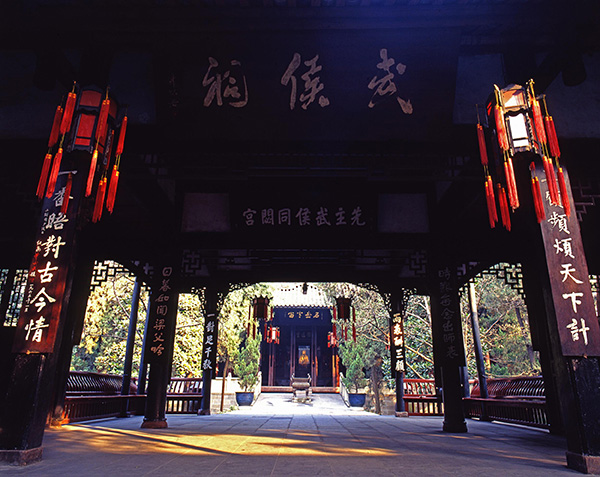 |
|
The Temple of Marquis Wu in downtown Chengdu contains the Hall of Zhuge Liang.[Photo by Ding Hao/China Daily] |
Before his death, Liu asked Zhuge to help his son rule his kingdom. He also said if his son proved to be a hopeless, weak-minded man, Zhuge could become the ruler of the kingdom. Liu's son did indeed prove to be a poor emperor, but instead of dethroning him, Zhuge assisted him in managing the kingdom until his death.
This is the reason that Zhuge has been held in such high esteem among people since ancient times, says Tan Jihe, a historian from Chengdu.
Enclosed by high red walls and filled with ancient trees, the Temple of Marquis Wu boasts relics from several dynasties, as well as the Hall of Zhuge Liang and the mausoleum of Liu Bei.
In the Hall of Zhuge Liang, the seated statue of Zhuge, his son and his grandson are enshrined. Both died in 262 in a battle against the invading Wei troops that eventually toppled the Shu Kingdom. Together with Zhuge, they have been held in great esteem by following generations for their loyalty to their kingdom.
The statue of Zhuge shows him dressed in a white cloak holding a feather fan in one hand, the picture of scholarly composure.
After the death of Liu, Zhuge tried to realize his unfulfilled dream of reunifying China. He set out on a series of six expeditions to the north of China over the space of eight years, trying to conquer the more powerful Wei Kingdom, which brought about the end to the Eastern Han Dynasty (25-220).
Before the first expedition, he sent a missive to Liu's son, the new emperor, outlining his reasons for undertaking the expedition and expressing his lifelong devotion to the task of reunifying China.